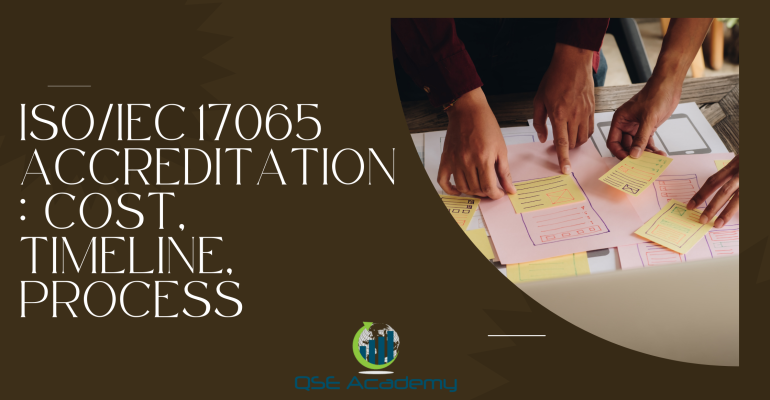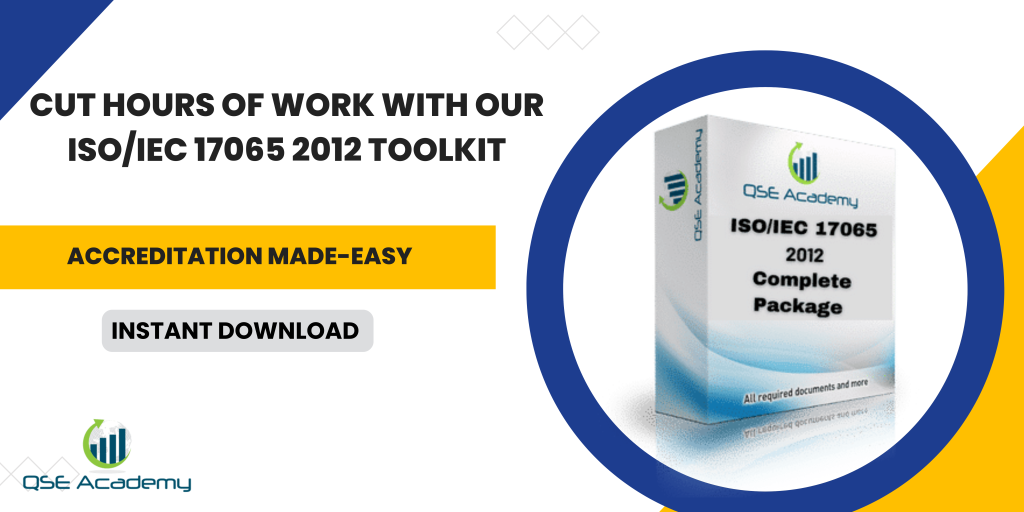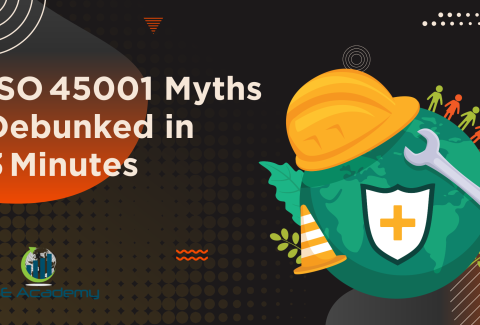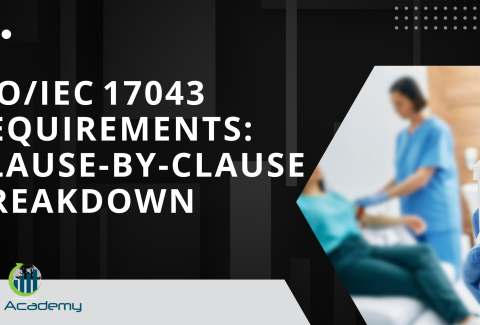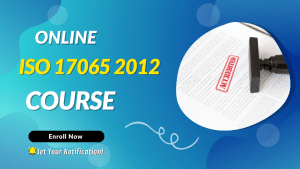ISO/IEC 17065 Accreditation: Cost, Timeline, Process
Last Updated on December 23, 2025 by Hafsa J.
ISO/IEC 17065 Accreditation: Cost, Timeline, Process
When certification bodies approach ISO/IEC 17065 accreditation, the same questions always come up: “How much does it cost?” “How long will it take?” “What exactly happens during the process?” This pillar article brings everything together into one cohesive guide—cost, timeline, and process—so you can plan accurately, prepare proactively, and avoid the delays that slow most organizations down.
Understanding the ISO/IEC 17065 Accreditation Process
The ISO/IEC 17065 accreditation process follows a clear structure, but the experience varies depending on your documentation maturity, product scope, and assessor availability. Here’s a step-by-step overview that aligns with what accreditation bodies actually expect.
Pre-application readiness
This phase is where you build the foundation. You refine your scheme documents, map competencies, audit your processes, establish impartiality controls, and ensure your evaluation methods comply with the standard. The stronger this phase is, the smoother the rest becomes.
Application submission
Submission includes your scheme description, organizational structure, impartiality analysis, subcontractor controls, and competence evidence. Accreditation bodies verify eligibility and request clarification if needed.
Document review
Assessors review your procedures, evaluation methods, documentation structure, and compliance with ISO/IEC 17065. If the system is well structured, document review is manageable. If not, you may face multiple rounds of corrective actions.
On-site assessment
Assessors evaluate real operational controls, interview key staff, inspect documentation, and verify implementation. This validates whether your system functions consistently, not only on paper but in practice.
Witness assessments
The accreditation body observes actual product evaluations or testing. This verifies evaluator competence, impartiality, and consistent application of scheme rules.
Final decision
A decision panel reviews evidence and assessment reports. When corrective actions are complete and effective, the accreditation body issues the accreditation.
A practical insight worth noting: I once supported a team that reduced document review time significantly by consolidating their procedures into a clear, hierarchical structure before submission. That single improvement reduced confusion during the review and minimized corrective-action cycles.
 ISO/IEC 17065 Accreditation Costs: What You Should Expect
ISO/IEC 17065 Accreditation Costs: What You Should Expect
Accreditation costs are influenced by several factors, not just the man-day rate. Understanding these components helps you budget accurately and avoid surprises.
Application fees
A one-time administrative fee, usually non-refundable.
Document review fees
Dependent on complexity and the volume of documentation. Assessors may need several days to review your internal structure.
On-site assessment fees
Calculated based on man-days, scope, risk level, and complexity. High-risk or multi-scheme bodies typically require more assessment time.
Witness assessment fees
Costs increase with the number of witness events required. Each event adds assessor time, travel, and reporting.
Travel and logistics
Rates vary by region. Remote assessments reduce travel, but not all activities can be performed remotely.
Annual surveillance fees
After accreditation, ongoing surveillance assessments incur yearly costs.
Cost varies widely between regions. Some accreditation bodies have predictable tariff structures, while others calculate rates based on assessor availability and technical scope. To control cost, request itemized quotations and justification for man-day allocations.
Accreditation Timeline: How Long It Really Takes
ISO/IEC 17065 accreditation typically takes six to twelve months when everything is well organized, but timelines vary. Each stage has its own duration.
Pre-application prep: 4–12 weeks
Depends on documentation maturity, scheme complexity, and staff readiness.
Document review: 2–8 weeks
Faster when documentation is clean; slower when assessors need clarification.
On-site assessment scheduling: 2–6 weeks
Assessor availability is often the biggest cause of delays.
Witness assessments: 1–3 days each
Not all schemes require multiple witness events, but many do.
Final accreditation decision: 4–12 weeks
Timing depends on the accreditation body’s internal queue.
Delays usually occur when documentation isn’t aligned with scheme requirements, assessor schedules conflict with product-evaluation activities, or corrective actions take too long to close.
Man-Day Calculation: How Accreditation Bodies Determine Assessment Duration
Man-day calculation isn’t arbitrary. Accreditation bodies consider several variables when determining how much time is needed.
Scope complexity
High-risk products such as electrical goods or regulated materials require more assessment time.
Number of schemes
Multiple schemes mean more procedures, records, and evaluations to examine.
Number of sites
Multi-site operations raise complexity and increase sampling requirements.
Subcontractors
External labs and evaluation partners require additional review.
Witness requirements
Each witnessed evaluation event adds additional man-days.
Accreditation bodies use structured methods when determining assessment duration. Give clear, accurate descriptions of your scope to avoid unnecessary man-day inflation.
Preparing for Accreditation: Documentation, Competence and Controls
Your preparation determines your experience. Strong preparation leads to efficient assessments; weak preparation leads to delays.
Documentation
Align scheme documents, procedures, records, and evaluation methods. Cross-reference them so assessors don’t need to interpret structure.
Competence
Maintain clear, updated evidence of evaluator competence, decision-maker qualifications, and impartiality committee function.
Operational controls
Ensure evaluation records are complete, consistent, and traceable.
Internal audits and monitoring
Perform thorough internal reviews to identify gaps before the assessor does.
Centralized documentation alone can shorten review and assessment time significantly.
Maintaining Accreditation: Surveillance Visits & Continual Compliance
Accreditation isn’t a one-time achievement. Surveillance visits verify that your system remains effective after accreditation.
Annual surveillance
Assessors review impartiality, competence evidence, records, complaints, appeals, and scheme updates.
Documentation updates
Regulatory changes, scheme revisions, and product updates require documented responses.
Witnessing
Triggered by new schemes, new evaluators, or risk indicators.
Continual improvement
Identifying weaknesses, updating procedures, and verifying corrective actions.
Organizations that maintain ongoing readiness avoid large corrective actions during surveillance.
Frequently Asked Questions
How much does ISO/IEC 17065 accreditation cost?
Costs vary widely but typically include application fees, document-review fees, assessment man-day rates, witness fees, travel, and annual surveillance fees. The final amount depends on your scope, region, and the chosen accreditation body.
How long does ISO/IEC 17065 accreditation take?
Most certification bodies complete the process within six to twelve months. Timelines depend on documentation quality, assessor availability, scope complexity, and witness events.
What is the biggest challenge during accreditation?
Documentation alignment and process maturity. When these are weak, corrective-action cycles extend the timeline and increase cost.
Conclusion: A Clear Path to ISO/IEC 17065 Accreditation
ISO/IEC 17065 accreditation becomes easier when you understand the full picture: the cost drivers, the timeline, and the process. Preparation, structure, and clarity reduce delays and eliminate surprises. Consistent documentation, aligned processes, competent staff, and proactive monitoring create a strong foundation not only for accreditation but for long-term compliance.
If you want a tailored cost estimate, a structured timeline, or a detailed readiness checklist tailored to your scheme, I can help you build a plan that keeps you efficient and audit-ready.
I hold a Master’s degree in Quality Management, and I’ve built my career specializing in the ISO/IEC 17000 series standards, including ISO/IEC 17025, ISO 15189, ISO/IEC 17020, and ISO/IEC 17065. My background includes hands-on experience in accreditation preparation, documentation development, and internal auditing for laboratories and certification bodies. I’ve worked closely with teams in testing, calibration, inspection, and medical laboratories, helping them achieve and maintain compliance with international accreditation requirements. I’ve also received professional training in internal audits for ISO/IEC 17025 and ISO 15189, with practical involvement in managing nonconformities, improving quality systems, and aligning operations with standard requirements. At QSE Academy, I contribute technical content that turns complex accreditation standards into practical, step-by-step guidance for labs and assessors around the world. I’m passionate about supporting quality-driven organizations and making the path to accreditation clear, structured, and achievable.

